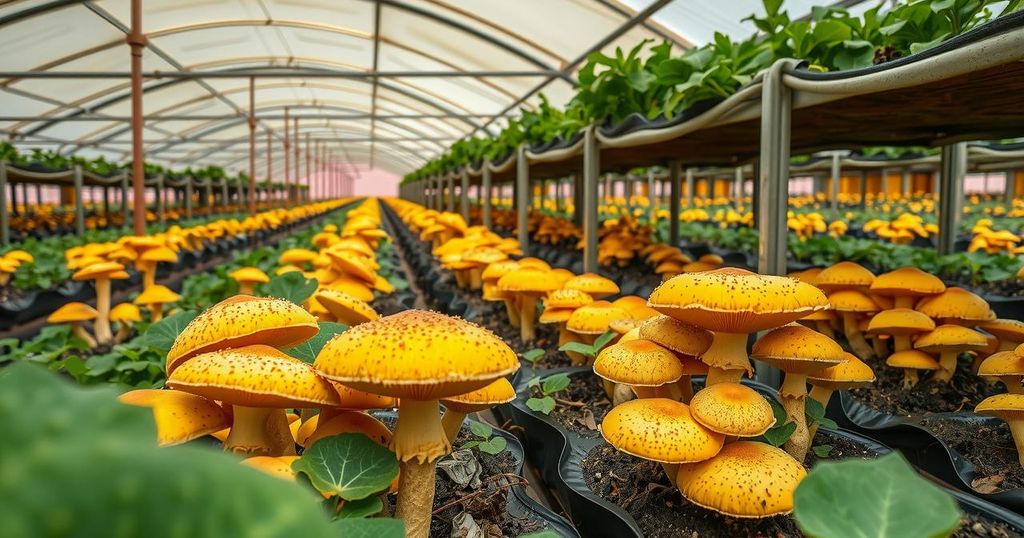Ethiopian Entrepreneur Transforms Mushrooms into Economic Opportunity

Mikias Tadesse, a 29-year-old entrepreneur in Ethiopia, transformed from a truck driver to a successful mushroom farmer. His journey began after he discovered mushrooms at a Chinese work camp, leading him to cultivate various mushroom types despite initial market resistance. Tadesse now operates a growing farm, grateful for the support from Chinese agricultural experts, and aims to expand both knowledge and market reach.
In the highlands of Ethiopia, the entrepreneurial spirit is shining brightly through Mikias Tadesse. Once a truck driver, Tadesse, 29, has transformed his life by venturing into mushroom farming on the outskirts of Addis Ababa. His journey has not only spurred a culinary movement but has also opened up new economic avenues in a country exploring more diverse dietary options.
The idea struck Tadesse about three years ago. He was drawn to mushrooms after a chance encounter at a Chinese road construction camp in a remote village. “Intrigued by a sight foreign to my Ethiopian culinary experience and out of curiosity, I decided to try a mushroom dish prepared by the Chinese chefs. To my surprise, I really enjoyed the dish,” he recalled. This experience sparked an idea: why not cultivate mushrooms in Ethiopia?
With the encouragement and guidance of his Chinese colleagues, Tadesse took his initial steps into mushroom cultivation. “Their response was immediate and very encouraging. They fully supported my business idea and promised to assist me in this new venture,” he said. The Chinese agricultural experts provided him with invaluable technical knowledge through hands-on training, which he credits as key to his initial success.
However, Tadesse faced significant obstacles including public unfamiliarity with mushrooms as a food source. “I faced major market resistance because most people simply did not see mushrooms as food,” Tadesse expressed. Despite some restaurants in Addis Ababa serving mushrooms, he found it challenging to market his products, encountering skepticism and numerous rejections.
After persistently promoting his mushrooms through various supermarkets and hotels, he slowly saw a change. Initially, Tadesse often had to retrieve unsold mushrooms back from the shelves. Nevertheless, demand began to grow, leading him to expand his farm to four cultivation sheds, each about 250 square meters.
Now, Tadesse cultivates Yellow mushrooms, King Trumpets, and Oyster mushrooms, producing an average of 50 kg weekly. He’s proud yet aware of the demand’s weight; “Though our farm produces an average of 50 kg of different varieties of mushrooms and has 12 dedicated workers, we are struggling to meet the growing demand,” he shared.
Amid this success, Tadesse remains thankful for the support provided by Chinese experts, who he considers foundational to his operation. The technical assistance he received has been a crucial factor in navigating the complexities of mushroom farming. Zheng Aibao, 59, a Chinese expert, noted, “This is my third time in Ethiopia. I am glad to see the mushroom cultivation method introduced by Chinese experts is taking root in five farms in the country.”
Tadesse’s aspirations extend beyond mere cultivation; he aims to deepen his expertise and eventually export processed mushrooms. “I believe that with coordinated efforts from both government and private sectors, mushrooms will end up on more dinner tables across Ethiopia and really help add variety to what people eat,” Tadesse concluded, confidently looking toward the future.
Mikias Tadesse exemplifies how a simple curiosity about mushrooms can lead to significant change. He has turned from a truck driver into a successful mushroom entrepreneur, showcasing how one person can influence local diets and create economic opportunities. With continued support and coupled efforts from various stakeholders, the mushroom industry in Ethiopia appears to be poised for growth and innovation.
Original Source: english.news.cn







